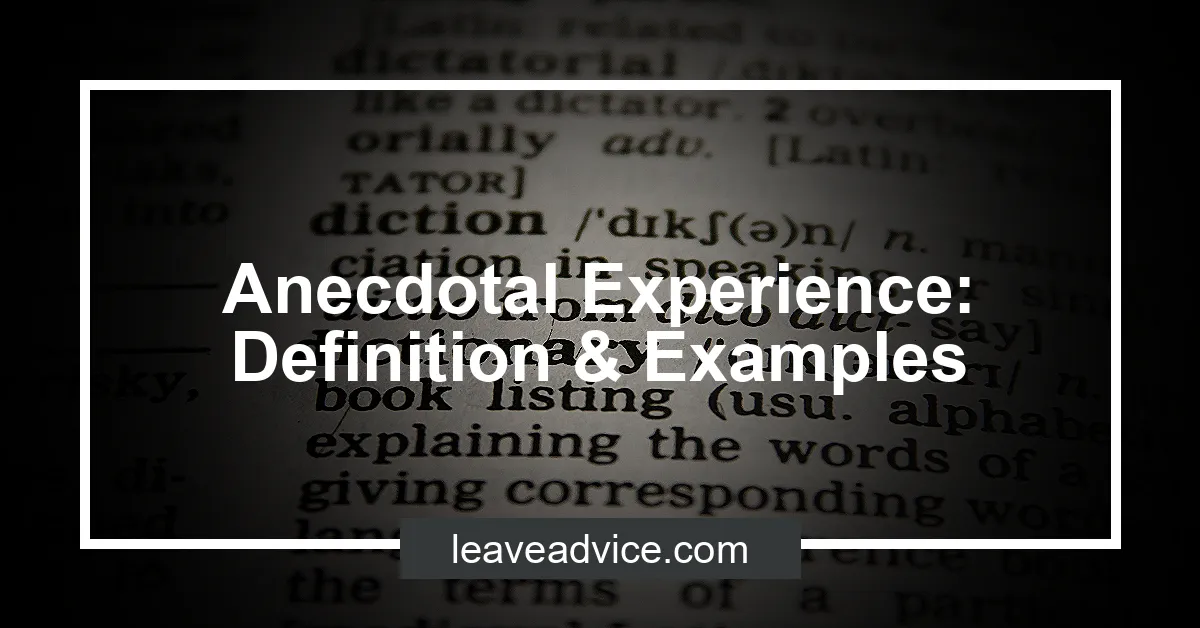Anecdotal Experience: Definition & Examples


Anecdotal experience refers to evidence or knowledge based on individual accounts rather than on reliable research or data.
Understanding human behavior can be greatly enhanced through anecdotal experience, as it provides real-life stories and observations that can offer valuable insights into how people think, feel, and act.
Anecdotal experience is important in gaining a more comprehensive understanding of human behavior, as it allows us to capture the nuances and complexities of individual experiences that may not be fully captured by quantitative data alone.
Check out this Youtube video: Dive into the fascinating world of anecdotal experiences and learn about the power of anecdotal evidence!
What is Anecdotal Experience?
Anecdotal experience refers to evidence or information that is based on personal accounts or stories rather than systematic research or objective data. It includes subjective observations and personal narratives that may not be verifiable or supported by comprehensive research.
Anecdotal evidence is often characterized by its reliance on individual experiences and lacks the scientific rigor and objectivity of empirical evidence.
Definition of Anecdotal Experience
The definition of anecdotal experience revolves around the use of personal stories and individual accounts as a basis for forming conclusions or making judgments. This type of evidence is often subjective and may not be universally applicable due to its reliance on individual experiences rather than comprehensive data and research.
Anecdotal evidence is commonly used in casual conversations, storytelling, and testimonies but may not hold the same weight as empirical, research-based evidence.
Characteristics of Anecdotal Experience
The key characteristics of anecdotal experience include its subjective nature, reliance on individual accounts, and the absence of systematic data collection or scientific validation. Anecdotal evidence is often based on personal observations, opinions, and narratives, making it more suitable for informal, anecdotal purposes rather than making broad, generalizable conclusions.
It is important to recognize that while anecdotal experiences can provide valuable insights, they should be approached with caution and not equated with rigorous, data-driven research.
The Role of Anecdotal Experience in Research
Anecdotal experience plays a crucial role in research by providing qualitative insights into individual experiences and perspectives. Researchers often utilize anecdotal evidence in the form of interviews, questionnaires, and case studies to gather rich and descriptive information.
This qualitative data aids in understanding human behavior, attitudes, and beliefs, contributing to a more comprehensive and nuanced interpretation of research findings.
How Anecdotal Experience is Utilized in Research
Anecdotal experience is utilized in research to capture the subjective viewpoints and lived experiences of individuals. By incorporating personal stories and narratives, researchers gain a deeper understanding of the human element within their study.
This approach allows for the exploration of intricate details, emotions, and contextual factors that quantitative data alone cannot provide. Furthermore, anecdotal evidence enriches the research process by adding a human touch and fostering empathy towards diverse perspectives.
Limitations of Relying Solely on Anecdotal Experience in Research
While anecdotal experience offers valuable qualitative insights, relying solely on it in research overlooks the need for empirical and verifiable evidence. The subjective nature of anecdotal data introduces the risk of bias and misinterpretation, potentially leading to unreliable conclusions.
Additionally, anecdotal evidence may lack generalizability and could be influenced by individual perceptions and circumstances, limiting its applicability to broader populations.
| Pros of Anecdotal Experience in Research | Cons of Solely Relying on Anecdotal Experience |
|---|---|
| Provides qualitative insights | Subjective nature may lead to bias |
| Captures individual perspectives | Lack of generalizability |
| Adds a human touch to research | Potential for unreliable conclusions |
Let’s ensure that while anecdotal experience enriches research, it’s always crucial to complement it with empirical evidence for a comprehensive and robust analysis.
Examples of Anecdotal Experience
Personal Anecdotes
A personal anecdote is a short narrative about an incident from one’s own life. For instance, switching to a standing desk improved my productivity and reduced back pain.
Additionally, trying mindfulness meditation helped me manage stress and anxiety more effectively.
Famous Anecdotal Experiences in History and Literature
In literature, Marcel Proust’s famous anecdote about the taste of a madeleine cookie triggering deep memories in “Swann’s Way” is a classic example. Similarly, in history, the story of the construction of London’s Big Ben, where the first bell cracked, causing a significant delay, is a notable historical anecdote.
Anecdotal Experience vs. Empirical Evidence
Anecdotal experiences rely on personal observations and casual information gathering, lacking systematic or scientific analysis. Conversely, empirical evidence stems from direct or indirect observations through experiments, forming a fundamental part of the scientific research method.
While anecdotal evidence is subjective and not verifiable in the same way as empirical evidence, it can still hold significance in specific contexts.
Distinguishing Between Anecdotal Experience and Empirical Evidence
Anecdotal experiences are often individual, subjective, and based on personal perceptions, while empirical evidence is derived from systematic observations or experiments. Anecdotal evidence lacks the scientific rigor and objectivity of empirical evidence, making it less reliable for drawing general conclusions.
When Anecdotal Experience Can Provide Valuable Insights
Anecdotal experiences can offer valuable insights in customer or product reviews, as a supplement to scientifically gathered data, or to illustrate a point in an argument. Additionally, anecdotal evidence can be influential in understanding customer emotions and connecting with the target market.
However, it is essential to recognize the limitations of anecdotal evidence and use it judiciously in conjunction with empirical data.
| Anecdotal Experience | Empirical Evidence |
|---|---|
| Subjective | Objective |
| Based on observations | Based on systematic research |
| Derived from personal perceptions | Derived from direct or indirect observations |
| Less reliable for general conclusions | Fundamental part of scientific research method |
While anecdotal experiences have their place, understanding the distinction between anecdotal experience and empirical evidence is crucial for making informed and accurate judgments.
How Anecdotal Experience Shapes Beliefs and Perceptions
Impact of Anecdotal Experience on Individual Beliefs
Anecdotal experience plays a significant role in shaping individual beliefs. When people hear compelling stories or firsthand accounts from others, it tends to resonate with them on a deeper level. For instance, if someone hears a personal anecdote about how a specific health supplement transformed someone’s life, they are more likely to believe in its efficacy, even without scientific evidence. This emotional connection to anecdotes can have a profound impact on individual beliefs, often outweighing factual evidence.
Influence of Anecdotal Experience on Decision Making
The influence of anecdotal experience on decision-making is substantial. People often rely on personal stories and experiences they’ve heard or encountered when making decisions, even in the face of contradictory statistical or scientific data. For example, individuals might opt for a particular medical treatment based on a friend’s success story with the same treatment, disregarding broader scientific recommendations. Such reliance on anecdotal evidence can lead to biased decision-making, where emotions and personal narratives overshadow objective facts.
| Anecdotal Experience | Impact on Beliefs and Decision Making |
|---|---|
| Emotional Connection | Shapes beliefs profoundly, often outweighing factual evidence |
| Biased Decision-Making | Influences choices based on personal stories, regardless of contradictory data |
Anecdotal experiences hold substantial sway over individual beliefs and decision-making processes, often overshadowing factual evidence and influencing biased choices.
Leveraging Anecdotal Experience for Personal Growth
Using Anecdotal Experience for Self-Reflection
Anecdotal experiences serve as powerful tools for self-reflection, enabling individuals to gain deep insights into their behaviors, emotions, and thought patterns. By recounting personal anecdotes, one can analyze their past actions, decisions, and the resulting outcomes, fostering a heightened sense of self-awareness and personal growth.
Learning from the Anecdotal Experiences of Others
Learning from the anecdotal experiences of others is a valuable source of wisdom and knowledge. By actively listening to and internalizing the narratives of others, individuals can gain valuable insights, perspectives, and life lessons.
These anecdotes provide a unique opportunity for individuals to expand their understanding, empathy, and wisdom, ultimately contributing to their personal growth and development.
Anecdotal Experience in Communication and Storytelling
Incorporating Anecdotes in Public Speaking
Incorporating anecdotes in public speaking is like adding flavorful seasoning to a dish. It captures attention, adds a personal touch, and makes the message memorable.
When weaving anecdotes into speeches, it’s crucial to ensure they are relatable and reinforce the key points. For instance, recounting a personal experience of overcoming adversity can inspire and resonate deeply with the audience.
The Power of Anecdotal Experience in Persuasion
The power of anecdotal experience in persuasion is unparalleled. It allows the audience to emotionally connect with the speaker and the message, influencing their beliefs and actions.
By sharing real-life stories or experiences, speakers can sway opinions and drive meaningful change. For instance, illustrating the impact of an employee benefit through a touching anecdote can effectively emphasize its significance and drive engagement.
| Key Points |
|---|
| – Anecdotes enhance public speaking engagement |
| – Anecdotal experience fosters emotional connection |
| – Personal stories aid in persuasion |
Keep anecdotes concise, relevant, and impactful to effectively communicate and drive the desired outcome.
Ethical Considerations in Sharing Anecdotal Experience
Ensuring Authenticity and Accuracy in Anecdotal Accounts
It’s crucial to ensure that anecdotal accounts are authentic and accurate to maintain their integrity. One way to achieve this is through diligent fact-checking and corroborating evidence to support the anecdote.
For example, if sharing a personal experience, providing specific details and context can enhance the authenticity, making the account more relatable and credible.
Addressing Bias and Misinterpretation in Anecdotal Experience
Addressing bias in anecdotal experiences is essential to maintain objectivity. By acknowledging potential biases and presenting a balanced perspective, the anecdotal account can be more transparent and trustworthy.
For instance, disclosing personal prejudices or influences that may have impacted the experience can help mitigate bias and prevent misinterpretation.
The Psychology of Anecdotal Experience
Understanding the Psychological Impact of Anecdotal Experience
Anecdotal experience has a profound psychological impact on individuals, often leading to an over-emphasis on recent negative experiences. This tendency can result in individuals being overly confident in their predictions, disregarding more reliable probabilistic information.
Moreover, cognitive biases influence individuals to recall notable or unusual examples instead of typical ones, further skewing their perspectives.
Cognitive Biases Related to Anecdotal Thinking
The cognitive biases related to anecdotal thinking, particularly the availability heuristic, significantly influence individuals’ decision-making. This bias leads individuals to place heightened importance on easily recollected experiences, undermining their objectivity and rationality.
Additionally, cognitive biases, such as anchoring bias, apophenia, and cognitive dissonance, collectively shape individuals’ thoughts and decision-making processes, complicating the accurate assessment of anecdotal evidence and experiences.
Debunking Myths Through Anecdotal Experience
Anecdotal experience is a powerful tool in challenging misconceptions. By sharing personal stories and experiences, individuals can directly confront and disprove false beliefs.
When people hear real-life examples, it can have a profound impact on reshaping their perspectives and correcting misinformation. Using anecdotes that clearly illustrate the truth helps in breaking down myths effectively.
Using Anecdotal Evidence to Challenge Misconceptions
By presenting anecdotes that directly contradict prevalent myths, individuals can effectively challenge misconceptions. Sharing personal experiences or those of others provides a relatable and tangible way to counter false beliefs.
For example, sharing anecdotes of successful recovery from a health scare can debunk myths about certain treatments or lifestyles, leading to a better-informed audience.
The Pitfalls of Relying on Anecdotal Experience for Debunking Myths
While anecdotes can be persuasive, they also have limitations when used to debunk myths. Anecdotal evidence alone may not reflect broader trends or statistical significance.
Relying solely on personal stories without empirical data can lead to biased interpretations and misinformation. It’s essential to complement anecdotal evidence with empirical research to provide a comprehensive understanding and avoid potential misconceptions.
Anecdotal Experience in Professional Settings
Incorporating Anecdotal Experience in Decision Making
Potential Pitfalls of Utilizing Anecdotal Experience in Professional Environments
Harnessing Anecdotal Experience for Social Change
Raising Awareness Through Personal Anecdotes
Using personal anecdotes can be a powerful tool in shining a light on social issues. When individuals share their real-life experiences, it creates a human connection and empathy that statistics and data often can’t achieve.
Take for instance the story of a single mother struggling to access affordable healthcare for her child – this resonates more deeply than just reading numbers on healthcare costs. Personal anecdotes can evoke emotions and motivate action, making them an impactful way to raise awareness and drive social change.
The Role of Anecdotal Experience in Advocacy and Activism
Anecdotal experiences play a vital role in advocacy and activism by giving a voice to those directly impacted by social issues. They provide a platform for marginalized voices to be heard and understood on a personal level.
For example, when a survivor of domestic violence shares their story, it humanizes the issue and emphasizes the urgent need for change. Through anecdotes, individuals can inspire others to stand up, support causes, and advocate for impactful policy changes, ultimately leading to tangible social transformation.
| Examples of Anecdotal Advocacy |
|---|
| A cancer survivor sharing their journey to advocate for better healthcare access |
| A refugee recounting their experiences to advocate for immigration policy reform |
| A LGBTQ+ individual sharing their story to raise awareness and push for equal rights |
Personal anecdotes are a potent force in driving social change, making them an invaluable tool for raising awareness and advocating for meaningful reforms.
Cultivating Critical Thinking in Evaluating Anecdotal Experience
Anecdotal evidence is often riddled with biases and lacks generalizability, making it vital to cultivate critical thinking skills in evaluating such accounts. Encouraging individuals to question the source, circumstances, and motivations behind anecdotal experiences is essential for fostering a discerning analytical mindset.
By teaching skills to analyze anecdotal accounts, individuals can learn to identify underlying assumptions, consider alternative perspectives, and ultimately discern the credibility of the presented information. Engaging in critical questioning and fact-checking can help in unraveling the potential biases and limitations inherent in anecdotal evidence.
The importance of context and corroboration in anecdotal evidence cannot be overstated. Emphasizing the need for corroborating evidence and contextual factors can guide individuals in comprehensively evaluating anecdotal accounts.
Understanding the significance of corroborating evidence and its role in strengthening the reliability of anecdotal experiences is crucial in cultivating a well-rounded perspective on the matter.
The Future of Anecdotal Experience in a Digital Age
In the age of social media, anecdotal experience has taken on a new level of significance and influence. As people share their stories and experiences on platforms like Facebook, Instagram, and Twitter, the reach and impact of anecdotal narratives have expanded exponentially, shaping public perceptions and driving conversations.
These stories, told through personal anecdotes, have the power to sway opinions, influence decisions, and even spark movements, making them a force to be reckoned with in the digital landscape.
Anecdotal Experience in the Age of Social Media
The widespread use of social media has greatly amplified the reach and impact of anecdotal experiences. Through platforms like TikTok and Snapchat, individuals have the ability to share their stories in a visual and engaging manner, leading to rapid dissemination and immense influence.
However, the downside of this is the potential for misinformation to spread unchecked, as anecdotal experiences, if not properly verified, can perpetuate false narratives and misconceptions. The era of social media has thus brought both the power and the risk of anecdotal storytelling to the forefront of digital communication.
The Evolution of Anecdotal Storytelling in the Digital Landscape
In the digital age, anecdotal storytelling has evolved from personal narratives shared around a campfire to impactful digital content with the potential to shape societal beliefs and behaviors. This evolution has been fueled by the accessibility and reach of the internet, enabling individuals to broadcast their anecdotal experiences to global audiences.
Furthermore, the use of multimedia elements such as videos and images has made anecdotal storytelling more immersive and engaging, facilitating deeper connections with wider audiences. However, this evolution has also brought challenges in distinguishing authentic narratives from fabricated or exaggerated anecdotes, emphasizing the need for critical consumption of anecdotal content in the digital landscape.
Recommended Amazon Products for Understanding Human Behavior
Here’s a curated list of products that can help you gain insights into human behavior. These recommendations are based on their educational value and positive customer reviews.
The Social Animal: The Hidden Sources of Love, Character, and Achievement


The Social Animal provides an in-depth exploration of human behavior and the factors that shape our actions. It delves into the subconscious motivations that drive human beings, offering valuable insights for those interested in understanding human behavior.
Pros and Cons of The Social Animal
| Pros | Cons |
|---|---|
| Detailed exploration of human behavior | Dense and scholarly writing style |
| Well-researched and evidence-based | Might be overwhelming for casual readers |
| Highly praised by readers |
Quiet: The Power of Introverts in a World That Can’t Stop Talking


Quiet offers a compelling look at the behavior of introverts and how they function in a world that favors extroversion. It’s a valuable resource for anyone seeking to understand the complexities of human behavior, particularly in social settings.
Pros and Cons of Quiet
| Pros | Cons |
|---|---|
| Eye-opening insights into introversion | Some readers might not relate to the subject matter |
| Well-researched and informative | Focused on a specific aspect of human behavior |
| Empathetic and thought-provoking |
Blink: The Power of Thinking Without Thinking


Blink examines the unconscious processes that influence our thoughts and decision-making, shedding light on the power of intuition and rapid cognition. This book is ideal for those interested in the psychological factors that shape human behavior.
Pros and Cons of Blink
| Pros | Cons |
|---|---|
| Fascinating exploration of intuitive thinking | Some concepts might be controversial or challenging |
| Compelling anecdotes and case studies | Critics argue for a more in-depth analysis |
| Easy to read and engaging |
Top Recommended Product for Understanding Human Behavior
If you’re looking for the best solution for understanding human behavior, we highly recommend The Social Animal: The Hidden Sources of Love, Character, and Achievement. This book offers comprehensive insights into the intricate workings of the human mind and behavior, making it a valuable resource for anyone interested in the subject.
Ready to dive into the depths of human behavior? Check out The Social Animal today for a fascinating journey into the forces that shape us as individuals and as members of society!
Conclusion
Anecdotal experience can provide valuable insights and perspectives that may not be captured by quantitative data alone. It offers a personal and qualitative understanding of a particular situation, making it a powerful tool for illustrating real-life scenarios and human experiences.
Additionally, anecdotal experience can be a source of inspiration and motivation, as it often involves storytelling and sharing of personal journeys. This can be particularly impactful in fields such as education, healthcare, and business, where relatable narratives can resonate with others and drive positive change.
Furthermore, while anecdotal experience should be approached with caution and skepticism, it should not be dismissed entirely. When used in conjunction with other forms of evidence, such as empirical research and statistical analysis, anecdotal experience can offer a well-rounded and comprehensive understanding of complex issues and human behavior.

















